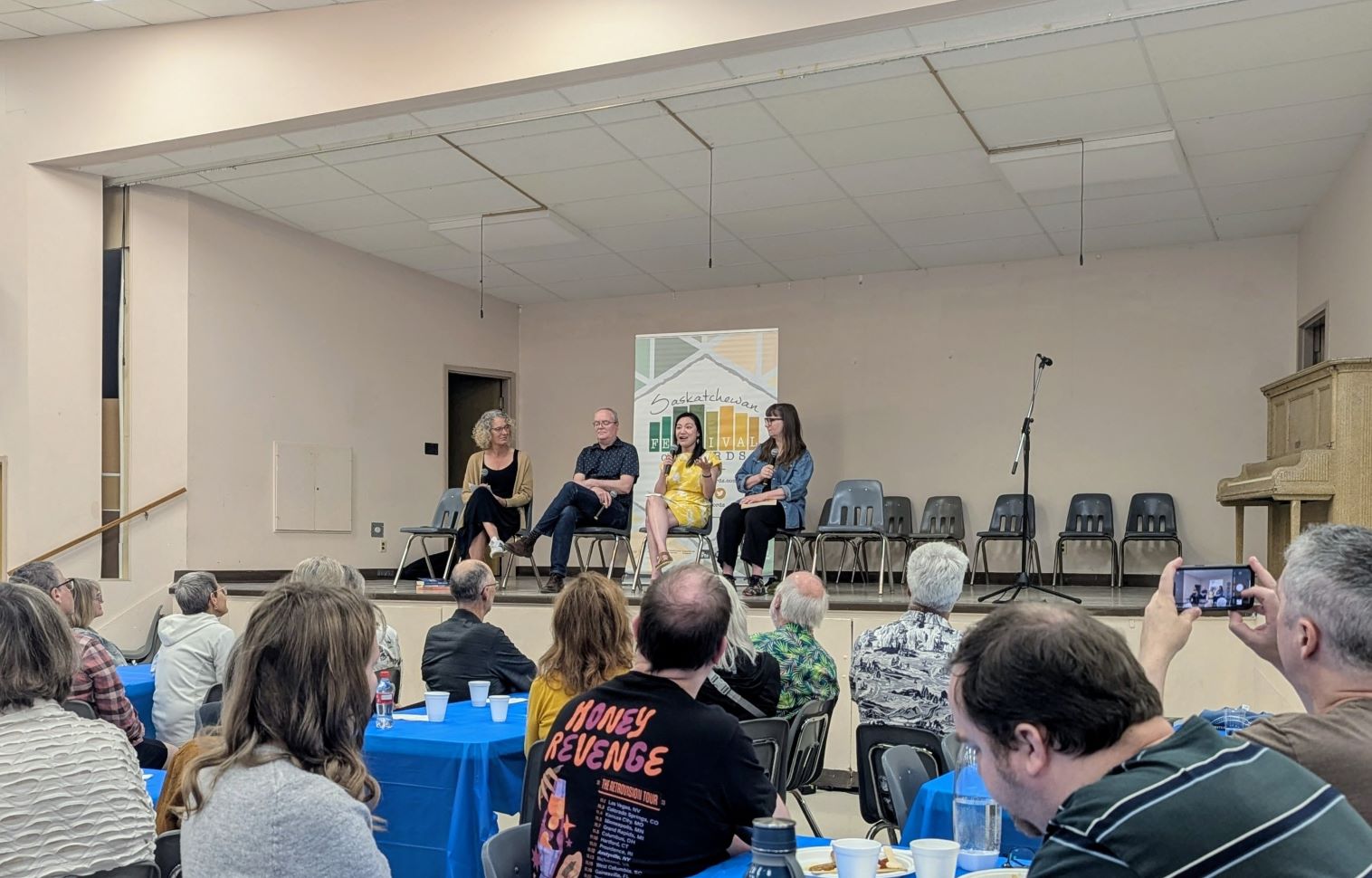The 2025 Saskatchewan Festival of Words concluded Sunday morning at the Cosmo Seniors Centre with a relaxed breakfast and two final author panels: a candid, funny, and thoughtful panel on romance writing, and a discussion on confronting inner darknesses with authors K.J. Aiello, Brandon Reid, and John Elizabeth Stintzi.
The romance-theme Love Languages panel, moderated by festival mainstay, author and literary professor Angie Abdou, featured authors Terry Fallis, Hudson Lin, and Jennifer Whiteford, who reflected on the conventions of romance writing, how their work stretches the genre, and the challenges and pleasures of crafting romantic fiction.
The discussion opened with an acknowledgment of romance’s signature convention: the “happily ever after.” Lin and Whiteford described the HEA as liberating, offering structure while allowing for immense creativity in plot and character. Fallis, whose book A New Season is essentially his first romance, admitted his surprise at this expectation but observed that many of his novels conclude happily regardless.
"I'm learning a lot about how to write a romance novel," Fallis joked, "now that I've finished writing my first one."
All three authors described themselves as meticulous plotters — carefully outlining every scene before drafting. They compared themselves to what Abdou called 'pant-sers' — authors who make no plans at all, writing each day by the seat of their pants. Lin admitted that sometimes her outlines end up longer than the book itself, prompting laughter from the audience.
The conversation turned to how the authors challenge genre traditions. Lin emphasized the inclusion of Asian and queer characters as central to her writing, expanding representation in contemporary romance. Whiteford said she enjoys crafting characters who are “real” and resist conventional molds. Fallis highlighted that his latest protagonist — a recently-widowed, middle-aged man — sits outside the genre’s usual demographic, nevertheless the story fits perfectly within romance’s broad parameters.
The panelists discussed authenticity and audience expectations, agreeing that readers often mistakenly conflate fiction with autobiography. Fallis said that after publishing A New Season, he'd received over 50 letters expressing condolences about the loss of his wife. Lin and Whiteford agreed that readers often assume they're getting to know an author directly.
"I've never been on a dragon boat team," Lin noted. "And, I don't know how to deliver a baby, even though my main character in this book is an obstetrician. I would freak out if I was presented with someone in labour."
In a lively exchange about writing sex scenes, they shared differing approaches: Fallis preferring to fade to black, Whiteford expressing awkwardness but willing to experiment, and Lin embracing explicitness but admitting it can be hard to keep scenes fresh and meaningful.
"I think I'm probably in the middle of, you know, the levels of graphicness," Whiteford laughed. "The graphic nature of the scenes... I do not enjoy writing them and I think the advice that I got was, well, just write what you're comfortable with... so that's what I do."
Whiteford added that as a rule, she does not discuss the close details of such scenes with readers ("I just started saying, 'No, no, that's OK, we don't have to talk about it.'")
When an audience member asked if serious themes like climate change have a place in romance, all three panelists said yes — asserting that social issues can naturally coexist within character-driven love stories.
The event’s tone was light and inviting throughout, with panelists swapping jokes about craft, reader assumptions, and the pleasure of writing quirky, memorable side characters.
In interviews after the panel, Festival Artistic Director Sarah Simison praised the weekend’s success and highlighted the 'Death Rides a Unicorn' spoken word show as a particularly refreshing addition this year.
"It was something new, and it was almost like improv games, but with Spoken Word, and it was just fun!"
The founder of Death Rides a Unicorn, poet Sean McGarragle, was one of the Festival's presenters this year, and Simison explained that McGarragle created the event after COVID when things felt a bit too heavy.
"Everything was really depressing, like spoken word was really depressing, and comedy was a little too raunchy, maybe. And he was like, 'how can we do something fun and uplifting and silly?' So yeah — enter the Unicorn."
Author Hudson Lin spoke warmly of her first visit to the Saskatchewan Festival of Words, describing it as relaxed and welcoming.
“This is a really lovely festival,” Lin said. “People are so friendly. I didn’t know what to expect, but it’s been a very relaxed and fun atmosphere.”
She especially enjoyed participating in the festival’s trivia night.
“I was worried I'd bring down the team, and we did end up coming second last,” she laughed, “but it was such a fun time that that didn't matter.”
The Saskatchewan Festival of Words returns next summer, once again offering readers and authors from across Canada a place to gather, reflect, and celebrate storytelling in all its forms.
